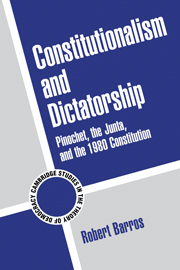Book contents
- Frontmatter
- Contents
- Foreword
- Acknowledgments
- Abbreviations
- Introduction
- 1 Dictatorship, Legality, and Institutional Constraints
- 2 The Constitution of the Exception: Defining the Rules of Military Rule
- 3 The Constitution and the Dictatorship: The Supreme Court and the Constitutionality of Decree-Laws
- 4 The Shadowy Boundary between Force and Law: The Judiciary, Repression, and the Cosmetic Limitation of Emergency Powers
- 5 Constitutionalization without Transition: Prompting the Dual Constitution of 1980
- 6 The Permanent Text: Constitutional Controls or Military Tutelage?
- 7 Even Custom Shoes Bind: Military Rule under the Constitution, 1981–1988
- 8 Military Dictatorship and Constitutionalism in Chile
- References
- Index
1 - Dictatorship, Legality, and Institutional Constraints
Published online by Cambridge University Press: 10 December 2009
- Frontmatter
- Contents
- Foreword
- Acknowledgments
- Abbreviations
- Introduction
- 1 Dictatorship, Legality, and Institutional Constraints
- 2 The Constitution of the Exception: Defining the Rules of Military Rule
- 3 The Constitution and the Dictatorship: The Supreme Court and the Constitutionality of Decree-Laws
- 4 The Shadowy Boundary between Force and Law: The Judiciary, Repression, and the Cosmetic Limitation of Emergency Powers
- 5 Constitutionalization without Transition: Prompting the Dual Constitution of 1980
- 6 The Permanent Text: Constitutional Controls or Military Tutelage?
- 7 Even Custom Shoes Bind: Military Rule under the Constitution, 1981–1988
- 8 Military Dictatorship and Constitutionalism in Chile
- References
- Index
Summary
The opposition between constitutionalism and dictatorship pervades the contemporary social sciences and reflects a long-standing theoretical conception of absolute power. This chapter explores the theoretical dimensions of the relationship between institutional constraints and dictatorship. After noting the prevalence of conceptions that view authoritarian power as unlimited, I explore at length the many aspects of the standard argument against autocratic self-limitation. To do this, I set out a conception of institutional limits, discuss the theory of sovereignty as an explanation of why rulers bearing absolute power cannot limit themselves, caution against conceptual confusions that might suggest facile – though inadequate – responses to the traditional theory, and conclude by presenting an account of the conditions under which institutional constraints might be effectively introduced under an authoritarian regime.
Dictatorship and Unbound Power
Since the beginning of the twentieth century the opposition of democracy and dictatorship has increasingly dominated political discourse on forms of government. In contrast to earlier classifications which elaborated variations on the classical trichotomy of monarchy, aristocracy, and democracy, the contemporary discussion of political regimes is largely exhausted in the dualism of dictatorship and democracy. Although scholars use a range of terms to refer to authoritarian regimes and have elaborated a number of subtypes, the principal criterion for differentiating dictatorship and democracy is the manner whereby laws binding upon a territory's inhabitants are created: In dictatorships laws are imposed from above, whereas through the mediation of elections and representation, laws emerge in democracies from among the very citizens who are subject to them.
- Type
- Chapter
- Information
- Constitutionalism and DictatorshipPinochet, the Junta, and the 1980 Constitution, pp. 10 - 35Publisher: Cambridge University PressPrint publication year: 2002



